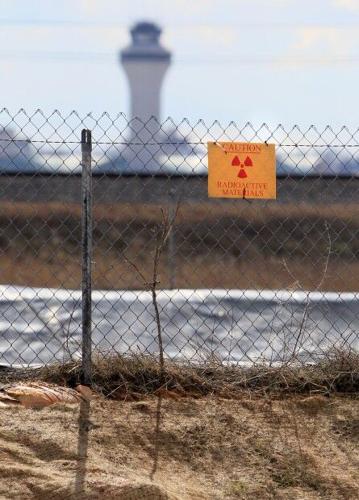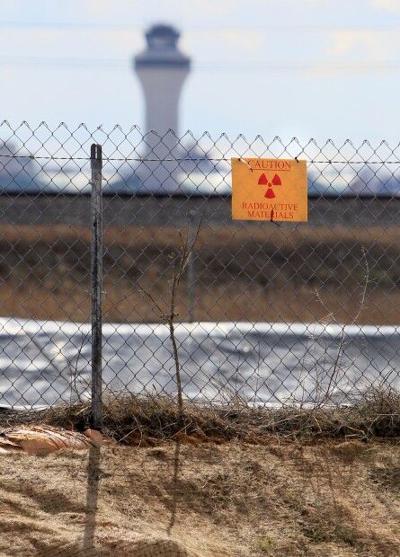Mark Twain had his river. Brad Payne had his creek. It was his playground. His brother’s, too.
They waded in it when the water was up. They dug caves in its banks when the water was low. They built forts out of the flotsam the creek delivered to them.
Now Payne and his brother wonder if Coldwater Creek was much of a refuge.
The creek was in the news last week. A group of North County residents reported the results of an informal survey in which one-third of the respondents who lived along the creek reported they had developed cancers. The survey was in contrast with a report last year from the Missouri health department that found no elevated risk of cancer linked to radiation for people living in the six ZIP codes adjacent to the creek.
The debate is not new. The creek was contaminated with radioactive waste. The contamination dates to a time when Mallinckrodt Chemical Works, which prepared refined uranium for the Manhattan Project, stored radioactive waste near the headwaters of the creek.
People are also reading…
Attorneys for Mallinckrodt have said the company was not involved in the disposal or cleanup of contaminated debris from its uranium processing. The headwaters are located near the airport. The creek winds its way through North County to the Missouri River.
There was no such debate when Butch and Kathleen Payne and their three young children moved to Florissant from Chicago 42 years ago. Brad was 4. His brother, Gregory, was 6. Their sister, Rhonda, was 9.
The creek was less than a block away. It was the go-to place for young boys.
Brad said he got sick almost immediately. He had a high fever. He could not eat. He lost the use of his legs. He was taken to Cardinal Glennon children’s hospital, where doctors discovered his white blood cell count was low. He was eventually diagnosed with rheumatoid arthritis. He recovered. He returned to the creek.
His parents divorced when he was 16. He moved with his father to Collinsville. He dropped out of high school, earned a GED. He got married and moved to Florida. Neither the move nor the marriage worked out. He moved back to Florissant about 10 years ago and moved in with his mother. And his brother. Things had just not clicked for Greg.
Brad worked day labor when he got back from Florida. In October 2004, he had a seizure at work. He said he was diagnosed with epilepsy.
Greg had seizures, too. In addition, Greg was diagnosed with throat cancer. He had radiation and then surgery.
There have been more maladies. Brad said he had a stroke four years ago. He showed me photos of his abdomen after appendix surgery this past August. He said his appendix had wrapped around his colon.
The brothers have ruddy complexions. They attribute that to a condition called rosacea.
Did their years playing in Coldwater Creek cause their medical problems? Maybe someday a judge and jury will make that determination.
Brad wants to sue. He said he had a lawyer once, but the lawyer dropped him because Brad pestered him. He has contacted another lawyer.
Greg does not seem so proactive. Maybe smoking caused his throat cancer. He still smokes.
Brad is on the Missouri version of Medicaid. Greg goes to a clinic.
Brad has applied for Social Security disability. In addition to the aforementioned conditions, he cited carpal tunnel syndrome. His application was denied. Greg said he was trying to get disability, too.
At the moment, the brothers get food stamps.
As you might imagine, it’s easy for the brothers to connect the dots — and not only the dots that connect their medical problems to the creek. Their connections go further. Mallinckrodt Chemical Works was essentially an agent of the government. That ties into the fact that the government now seems to be dismissive of the relationship between the radioactive waste — their radioactive waste — and the medical problems of the people who lived alongside the creek.
Furthermore, it is the government that has denied Brad’s disability claim.
Maybe that takes things a little far. I don’t know. But the group behind the recent survey said they first became concerned a few years ago when they noticed a spike in cancers among friends in their late 30s and early 40s.
Brad and Greg would be in that group. They seem young to have the kind of medical histories they have. They claim it’s not genetics. They say this stuff did not run in the family.
Instead, it struck a couple of men who once spent many happy hours playing in and around a picturesque creek that bubbled along near their house and behind their grade school.
How lucky it seemed to have their own mini-version of Mark Twain’s mighty river. Or maybe not.









